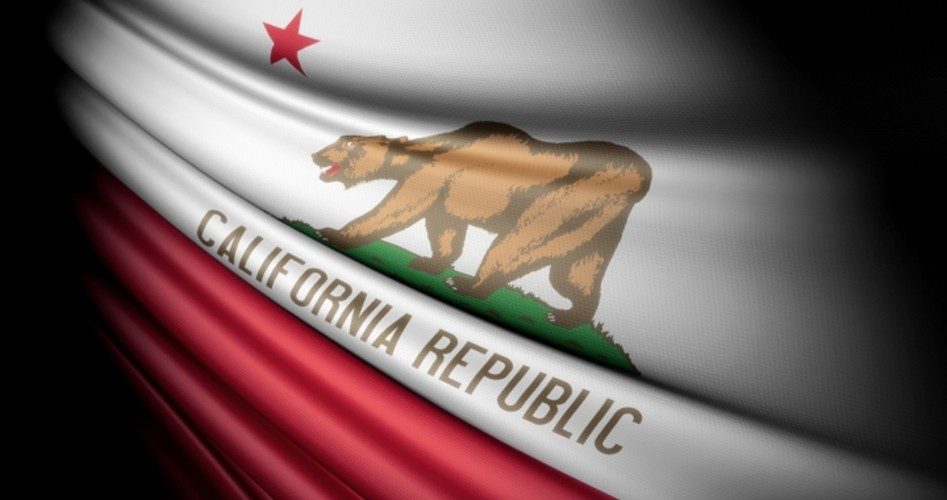
Both houses of the California legislature voted on July 17 to pass AB 398, which extends and builds upon the state’s cap-and-trade program in the name of fighting climate change. The measure was approved by a two-thirds majority in both houses, a margin that Gov. Jerry Brown said legislatures must meet to avoid any potential legal challenges. It was passed 55 to 21 in the Assembly and 28 to 12 in the Senate.
The claimed objective of the legislation is to reduce so-called greenhouse gas emissions, which “global warming” alarmists contend contributes to “climate change” — a theory that has been strongly disputed by many climate scientists.
Even if a definite cause-and-effect relationship could be established between the increase in carbon dioxide and an increase in temperature, the type of action mandated by AB 398 would have no discernible effect on global termperatures. Sen. Anthony Vidak (R-Hanford) argued that California produces just one percent of the greenhouse gas emissions on the planet, and that efforts to reduce climate change within the state’s borders, are pointless.
“We could shut down the entire state of California, and it would have absolutely no effect on the world climate,” Vidak said.
Among the things that AB 398 would do, according to the state senate’s analysis, are:
• Extends the Air Resources Board’s (ARB) cap and trade authority through 2030. (The previous cap and trade program was set to expire in 2020.)
• Requires ARB to establish a price ceiling on greenhouse gas (GHG) emission allowances.
• Adds several new conditions governing the management and allocation of allowances, reduces limits on compliance offsets, requires ARB to designate the cap and trade regulation as the GHG emission reduction rule for petroleum refineries and oil and gas production facilities.
Under the legislative program, the state imposes a statewide cap on carbon dioxide emissions. However, companies are permitted to buy and sell pollution credits, allowing them to exceed the cap. Hence the term “cap and trade.”
The New York Times reported that eight Republicans voted for the bill, attributing their votes to what many described as “the need to deal with climate change” — a position that differentiated them from the Republican leadership in Washington.
The difference was noted by Assembly Republican leader Chad Mayes (R-Yucca Valley), who pushed members of his caucus to work with Democrats to pass the measure. “California Republicans are different than national Republicans,” said Mayes. “Many of us believe that climate change is real, and that it’s a responsibility we have to work to address it.”
If the assessment by Mayes of the California GOP is correct, it might explain why the state’s hostile business climate has prompted many companies to flee the Golden State for more business-friendly states. As was noted in an article titled “Fleeing California” in the Washington Times in 2015:
Governing magazine surveyed entrepreneurs and business owners and gives Texas, Utah, Idaho and Virginia grades of “A+”, and Tennessee an “A.” California, whose businesses are strangled by red tape that makes starting and running a successful business difficult, gets an F, for failure. California annually ranks last in Chief Executive magazine’s ranking of “Best States / Worst States.”
California’s cap and trade program can be added to the other regulations and high taxes that have caused the state to rank last as a good place to start a business.
Opponents of AB 398, reported the New York Times, complained that the measure would increase gas prices and home utility bills.
The existing cap and trade program raised gas prices by 11 cents a gallon, the state’s legislative analyst reported last year. California already has the second-highest gas prices in the nation’s (exceeded only by Hawaii), averaging $2.91 a gallon for regular.
While some supporters of programs such as cap and trade acknowledge its cost to business, but are willing to accept that cost as the price of preventing “climate change,” their underlying premise is based on propaganda rather than scientific fact.
The New American has published many articles detailing the frauds and misrepresentations of those who maintain that anthropogenic (human-caused) global warming, or AGW, is a potentially devastating crisis that can be averted only by suspending most industrial activity. (The reader may wish to review some of the related articles listed below to gain greater insight into the political agenda behind the false alarms broadcast by these “global warming” doomsayers.)
Though we could point to dozens of such reports, a good place to start might be “Does Anyone Agree With Trump’s Paris Agreement Pullout? Yes Indeed,” a significantly updated version of an article that appeared originally under the title “Meet the Climate Realists” in the The New American’s January 2016 special report on climate after the Paris conference. (To order the report in either PDF or print format, click here.) The above-cited article, “Does Anyone Agree …,” profiles half a dozen respected climate scientists who are but a short sampling of the tens of thousands of their colleagues in the scientific community who maintain an unbiased skepticism toward anthropogenic [human-caused] global warming [AGW]. They have stood their ground even at the risk of acquiring the career-jeopardizing slur of climate change “denier.”
Photo: Thinkstock
Related articles:
Report Explodes Global-warming Alarmism — “Adjusted” Data Accounts for All the Hyped Temperatures
Top Climate Alarmist: Computer Models Wrong, Skeptics Right on “Pause”
With Nod to Sovereignty, Trump Dumps UN “Climate” Regime
Three Big Coal Companies Ask Trump to Honor Unratified Paris Climate Agreement
Congress Investigates Fraudulent Science Used by NOAA to Push UN Global Warming Treaty
Retired NOAA Scientist Disputes Agency’s Study Denying Global-warming Hiatus
Global Warming Alarmist NY Times Discovers Cold Is 17 Times Deadlier
Fake News of Polar Bears Dying From Global Warming Exposed — Again
Biggest Fake News Story: Global Warming and Phony Consensus
Hiding the Hiatus: Global Warming on Pause
Climate Fraud? Rep. Warns NOAA of Hiding Subpoenaed Data
IPCC’s Bogus Claims About Melting Glaciers


